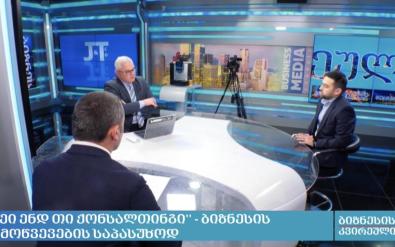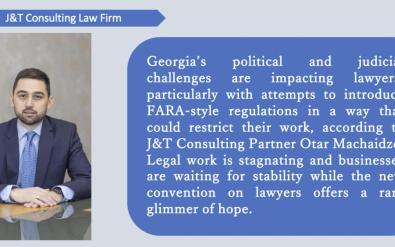The Diary of a headstrong negotiator - What remains after the negotiations are over?

26.07.2021
Author: Giorgi Tsertsvadze
You are now visiting the official website of our law firm (indeed you are, since you are reading this text) that generally works on resolving disputes in business field. Of course we are familiar with managing transactions as well, but we are lawyers mainly known for defending clients’ rights in court or arbitration rather than leading negotiations on transactions.
However, since pandemic, things have started to change slowly for some reason. As a rule, most of the company's income was related to legal representation in court / arbitration. The sudden change was reflected in the numbers as well.
In the past six months (or one could also say for the first time in the firm’s thirteen-year history) we were paid more to avoid a dispute through negotiation, rather than to prove ourselves in the court.
To analyze the reason standing behind this will take us far. For this small text, it is sufficient to just say that it actually happened and in almost all cases the client came to us with a request to initiate a lawsuit / an arbitration.
- How about trying the negotiation?
Almost every client took this question skeptically with a tint of pessimism in it:
“They crushed me when I was having a rough time. What is the point of talking to them? They will come to their senses when they get what they deserve!” – one client said and then added: “If you do not want to start the dispute then let’s not waste time. I was told that you’d do exactly what I’d like you to…”
“I have been trying to do that for five months, but you know what? When one is born a man of intrigue, no talking will help. I have nothing to say to them…still want to try? Alright, go on. I will be watching from afar, but I don’t want to waste another five months” – said the other one and looked me in the eye.
“There is this one issue: I am not sure whether it is reasonable to talk to him. Behind him stands another man. He is the one making decisions. Shall we talk to him instead? That is a good idea, I haven’t tried it. But is it worth it? We won’t waste our time, will we? We could’ve requested the attachment of the property at least…” – and the third one turned his head with a grief.
However, there was only one exception:
“Maybe it will be better if you talk to him. Yes! Yes! He knows you well and respects you. I don’t have much of a hope though, but since you have come up with…the idea of negotiation…alright then! – But I shall get what I want. I am not taking a step back.”
In all the above mentioned cases we started the negotiations.
In the beginning, the argument about dragging out the time in the court was of great help.
The cost-effectiveness of the negotiation was likeable as well.
Typically, this is how it works: For example, had you gone to the court it would have cost you 100 GEL. Now that you have chosen to negotiate, it will cost you 70 GEL. If the negotiations are successful, your costs will not expand any further. If the negotiation fails to succeed, it will cost you additional 30 GEL and that sums up to 100. You can stop the negotiations at any time. You manage the process, you manage the time and your expenses do not increase.
This scheme of working turned out to be acceptable even to the skeptics of them all.
And so, we began.
The participants of the negotiations were from different national, educational or social background, from different countries. We worked as legal representatives of foreign companies against Georgian companies and vice versa. Georgian companies against Georgian companies – there was only one such case and it turned out to be in the absolute minority.
The subject matter of the disputes covered various fields, namely: high technologies, shipping, construction, distribution, food industry. The value of the subject matter for various disputes in total amounted to approximately 30 million GEL.
The most interesting part here is that in almost all cases the participants reached an agreement.
The court was not involved in any of them.
- What made it work out?
The outcome tends to make one feel full of joy and pride, but it would not be fair to give all the credits only to our company. This is not something a good man would do, I believe.
The controversy between the parties raised and inhabited in different cultural or social environment was interesting to observe. To see the problem from their point of view and how greatly their perception differed from one another.
First of all, it is the constant willingness and readiness to pour one’s heart and soul into this “big mess” that makes it work out. It gives a great deal of happiness to the party when she/he discovers that her/his opponent’s lawyer is willing to listen to her/him complaining for an hour and a half on Saturday evening.
It is beyond comfort when your team re-edits the draft of bilingual (or trilingual – even though only Russian and English versions are needed, sometimes client wants a Georgian version as well, because “why not?” – the client says) agreement, sometimes even four times a day, and manages so that there is no need for you to read it (mainly because you are just unable to).
There is one Georgian proverb that says: “While the tandoor[1] is still hot, bake the bread” („სანამ თონე ცხელია, პური მანამ ჩააკარიო“) – which perfectly fits the process of negotiation. There is always some “momentum” which cannot be slipped through one’s fingers. If you feel like you have missed it – stay calm and start from the beginning patiently and carefully. Of course you do not know what it may bring, but you have no other choice – therefore, you have to begin!
- How to begin?
The answer is not that simple. It could be a letter, a memorandum or a phone call. No one knows with whom what will work.
The lawyer engaged in negotiation shall always remember that her/his involvement in the case will certainly strain the situation in the beginning. The opposing party responds with cautious and restrained anger to the letter sent to her/him by the lawyer. It is especially felt through the phone call or the meeting. You should know that you were not expected. Your client’s decision to engage a lawyer in the case forces the other party to think involving a lawyer herself/himself. This is an additional expense to her/him and apparently not a necessary one.
Is it possible for a lawyer to gain the trust of the other party? – The answer is absolutely positive.
The next question is – how?
Without doubt, there is no one-size-fits-all approach. In each case it is individual. If the party is Austrian, recalling the days spent in Vienna might help. One or two words spoken in German at this time will assuredly be of great assist. Talking about Kipiani and Chivadze might help to relieve the tension for the party that is from the neighborhood of our country.
Hardly there are any red lines here. As one of my good American friend tends to say – “Use everything whatever works”.
However, there still exists at least one red line (in my opinion):
Lying in negotiations is fatal. A lawyer that strives to earn the trust and respect of the other party shall always remember this.
It may seem quite trivial or dull but it is true.
And not because lying is bad.
The reason is simple: these particular parties already have the experience of an unfriendly relation, where both feel deceived. This is why they are being careful. If they caught you lying, the value of your word in the negotiation instantly becomes equal to zero. It means the end of the negotiations. And not just the end of negotiations, the end of your reputation in the eyes of these particular people. They may not consider you a bad lawyer, but they will never trust your word again. This line might not be the reddest one since it depends on what your aim is. If earning people’s trust is not what you seek (which might not be the worst professional trait), then you have been reading these last three paragraphs in vain.
The next red line: No matter how comfortable it may seem, never ignore people in negotiations.
Look at the phone – the name appears. You know you are likely to be engaged in an unpleasant conversation. You might as well know that the caller wants to provoke you somehow (and is recording the conversation anxiously).
Once again – Ignorance is fatal!
One of our clients was quite confused:
“I know she/he is calling you but just don’t answer it and that’s all!”
If you really want to succeed in negotiating, never do this under any circumstances.
Instead, you will see how the threads of trust begin to tie in when you hear a pleased voice from the other side:
“I really didn’t expect that you would actually answer me…”
Unfortunately, in our country, you will often hear from the academic circle that negotiators shall be very soft, warm, gentle and sweet. This country or region or even the continent won’t allow it. Clearly, delicacy and choosing words wisely are vital, but there is a situation when expressing the right reaction is crucial. To be honest, I do not really think that negotiator will be able to achieve anything in Georgia without showing some emotions.
Respect (or even disrespect) comes from individuality. Individuality without emotion does not exist in Georgia.
And finally – after gaining trust, there is one interesting, yet a bit comical, obstacle to overcome: Do not be surprised if one day the opposing party approaches you and asks: What do you recommend? What should I do?
Again – this is the opposing party.
At this point, a reminder of the statuses in this negotiation is necessary.
She/he shall hear it again that you are on the other side and giving advice won’t be appropriate. You do not even have the right to do that.
One must be very careful here. There were two out of five cases where I honestly said that it was not an advice but it was something I would have done myself being in their places. None of them liked it. Even though I was genuine with my words and really would have done it that way. Both of them were grateful though. Perhaps because they felt that I was being sincere.
This small letter should probably end here. Nonetheless, negotiations and lawyers are as much as inseparable as stage and actors are – they won’t exist without one another. If you have participated in it at least once, it is difficult not to do it again.
If you ever need me, do not hesitate.
How about trying the negotiation?
[1] A Georgian tandoor oven is called the Tone (თონე) - a cylindrical clay oven used in cooking and baking. This Georgian proverb has the same meaning as the proverb - “Make hay while the sun shines”.






